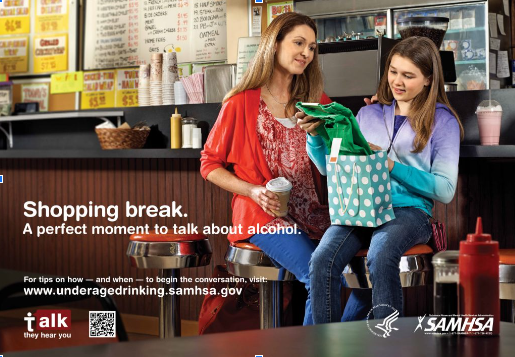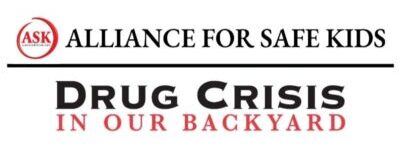April is Alcohol Awareness Month
Why Small Conversations Make a Big Impression (SAMHSA)
Talking to your child at an early age about drinking is the first step toward keeping them alcohol-free. But as they enter junior high and high school, the pressure to try alcohol increases. It’s important to continue the conversation throughout adolescence.
Talking often builds an open, trusting relationship with your child.
Children are more likely to avoid drinking when they have a strong, trusting relationship with their parents. Get into the habit of chatting with your child every day. It will make it easier to have serious conversations about things like alcohol, and will make your child more comfortable coming to you for advice.
Lots of little talks are more effective than one “big talk.”
Sitting down for the “big talk” about alcohol can be intimidating for both you and your child. Try using everyday opportunities to talk— in the car, during dinner, or while you and your child are watching TV. Having lots of little talks takes the pressure off trying to get all of the information out in one lengthy discussion, and your child will be less likely to tune you out.
When you do talk about alcohol, make your views and rules clear.
Take the time to discuss your beliefs and opinions about alcohol with your child. Be honest and express a clear, consistent message that underage drinking is unacceptable. When they feel that you’re being real and honest with them, they’ll be more likely to respect your rules about underage drinking.
As children get older, the conversation changes.
What you say to a 9-year-old about alcohol is different from what you say to a 15-year-old. Children also can’t learn all they need to know from a single discussion. Make sure that the information you offer your child fits their age. As they get older, you can give them more information and reinforce your rules.
Remember that the conversation goes both ways.
Although talking to your child about your thoughts about alcohol is essential, it’s also important to hear their point of view. Give your child the opportunity to ask you questions, and listen to what they have to say. Children who have parents who listen to their feelings and concerns are more likely to say “no” to alcohol.
What you do is just as important as what you say.
In addition to talking often with your child about alcohol, it’s important to set a good example. If you choose to drink, you can positively influence your child by drinking in moderation and NEVER driving when you’ve been drinking. Be aware of where you keep your alcohol, and always remind your child that the alcohol in your house is off-limits.

Virtual Save A Life Wellness Fair
ASK’s virtual Save A Life Wellness Fair will connect you to resources that support Substance Misuse Prevention, Treatment and Recovery; Mental Health and Opportunities for Thoughtful Service.
Click here to view the virtual Save A Life Wellness Fair and download the application on your phone. You never know when you, a friend, neighbor or loved one may need this vital information and by having it readily available it truly may be the most important gift you have ever given yourself or shared.
Life is hard, let’s be prepared to take good care of ourselves and one another.
Facts About Fentanyl
Volunteer Opportunities
There are a variety of volunteer opportunities at awesome nonprofits throughout Westchester and Putnam Counties. To view these opportunities, please check out Volunteer New York!
The John C. Hart Memorial Library in Shrub Oak can always use some volunteers! To find out about their Teen Volunteer Program, click here.
Yorktown Leos Club
Leadership, Experience, Opportunity! The Yorktown Leos are a community service club for people ages 12-25 willing to help others in the community. They host and participate in a variety of fun and collaborative events. The Yorktown Leos Club has been helping the Yorktown community for over 25 years and to learn how to get involved, click here.

Help is available. Parent and Family Coaching for anyone loving someone with substance misuse…
Substances including alcohol affect many families. Data compiled by Gallup’s Annual Crime poll conducted in 2021 reported 32% of families across all demographics are experiencing drug problems in their homes. However, because of the cultural stigma associated with misuse, many people are embarrassed to talk about it and therefore cannot find strategies and support to help themselves or their loved ones.
At Drug Crisis in Our Backyard, we have been working diligently for 13 years to overcome the stigma associated with chronic use. We lived with substance misuse and didn’t know where to turn for help and advice. Now help is available.
Drug Crisis in Our Backyard has a team of educated coaches with lived experience that will meet in person or virtually. We learn more about your specific situation and guide you with resources and ideas to move your family forward in a better direction. We use an evidence-based model to educate you on strategies to help your loved one make better choices. No one knows as well as we do how difficult it is living and loving someone misusing substances. We can help. Text Susan Salomone at 914-582-8384 for an appointment to speak with one of our family support coaches.
Weekly Spotlight Family Support Groups
From our partners at Drug Crisis in Our Backyard, weekly Spotlight Family Support Groups, held virtually every Tuesday and Wednesday via Zoom. Spotlight on Recovery is a Family Educational and Support Group for families struggling with a loved one misusing substances. For more information, click here.
Weekly Yoga for Resilience
Do you have a loved one struggling with addiction? Are you feeling overwhelmed? Carve out time for yourself so you may respond to your loved one with a clear mind and an open heart. Join us on Zoom and we will come together in a safe space to practice somatic mindfulness, grounding and centering, containment and breath regulation. For more information, click here.
April 17 – Virtual Naloxone Training
Naloxone is a prescription medicine that reverses an overdose by blocking heroin or other opioids in the nervous system for 30-90 minutes. Naloxone is administered by injection or intranasal. Following training, participants receive a kit by mail. Please join our partners at Drug Crisis in Our Backyard on Zoom at 6:30pm. Register by email: ssal@drugcrisisinourbackyard.com
Student Assistance Services Corner
“Helping Students Enhance Their Well Being by Making Healthy Decisions and Remaining Substance Free”
A partnership between a parent/guardian and Student Assistance Counselor best supports the nurturing of the social and emotional wellbeing of students. We encourage you to contact the SAC at your child’s school for a confidential consultation. Click here to learn more.
Lakeland High School Sasha Meyer Porco, LMSW, CASAC smeyerporco@lakelandschools.org
Yorktown High School Kiara Loughran, MS sacounselor@yorktown.org
Lakeland Copper Beech Middle School Ms. Finan, MS lfinan@lakelandschools.org
Upcoming Events
April 1 – Setting Healthy Boundaries in Relationships
Maintaining a balance between caring for loved ones and setting healthy boundaries for yourself can be challenging. Learn how to express your own needs without guilt, strike a healthy balance between caregiving and self-care, and tips for negotiating compromises. Register here.
April 8 – Launch, Don’t Crash: Tips to Help them Fly the Nest
Preparing your child for life after high school starts long before graduation. Building independence and confidence in managing their own health and wellness is a process that should begin early—even before high school. Presented by Operation Parent. Register here.
April 9 – Empowering Families: Navigating Co-Occurring Disorders for a Resilient Future
This presentation will highlight the power of prevention and early identification, exploring the three pathways to COD, along with risk and protective factors. Participants will also gain insights on recognizing early signs and being proactive in getting support. Hosted by K.N.O.W. 2 Prevent and presented by Stephanie Marquesano, founder of The Harris Project and Lorena Rucaj, LMHC and Westchester County Encompass Coordinator. Register here.
April 9 – Cannabis and Mental Health
With expanded legalization and use of cannabis, it is crucial to explore the potential impacts it can have on mental well-being. This webinar provides evidence-based insights to promote a better understanding of the topic. Register here.
April 15 – Responding in a Mental Health Emergency
We know what to do when someone breaks their arm: brace it and go to the hospital. But what should you do when someone is experiencing a mental health emergency? Learn what causes crisis situations and the warning signs, how to respond, and what to do once the crisis has ended. Register here.
April 21 – Talking to Children About Alcohol & Substance Use in the Family
Having a loved one with alcohol or drug dependency affects everyone in the family and can be especially confusing for children. Learn how to talk about caregiver/relative substance and alcohol use with kids, how to tailor the discussion to the child’s developmental stage, and how to create a supportive environment where children feel safe to express their concerns and ask questions. Register here.
NAMI Westchester The families and members of NAMI Westchester are here to help! They offer understanding to anyone concerned about mental illnesses and the treatment of mental illness. To view their calendar, click here.
Westchester Breathes is an ongoing program offered by the Westchester Library System offering an experience of gentle movement, breathing and relaxation exercises that reduce stress and anxiety and increase a sense of calm and well-being. These exercises are simple and evidence-based – which is to say …they work! They are free and on Zoom. Register here.
